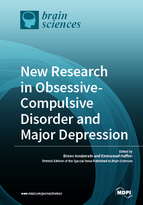New Research in Obsessive-Compulsive Disorder and Major Depression
A special issue of Brain Sciences (ISSN 2076-3425).
Deadline for manuscript submissions: closed (31 March 2018) | Viewed by 50198
Special Issue Editors
Interests: immuno-inflammation; frontal-subcortical loops; cognition; motivation; major depression; obsessive–compulsive disorder
Special Issue Information
Dear Colleagues,
Major depression and obsessive–compulsive disorder (OCD) are now recognized among the most frequent psychiatric disorders, affecting 16–17% and 2–3% of the general population, respectively. They are commonly characterized by: i) a high level of psychiatric and somatic comorbidities; ii) a recurrence or chronic profile; and iii) a negative impact on daily functions, thereby leading to a profound impairment of quality of life. Despite significant advances in pharmacological and psychological therapies over the last decades, unsuccessful responses to standard treatment strategies are classically observed in approximately 20–30% of cases. Therefore, there is a significant need for improving the pathophysiological knowledge through a better identification of environmental, clinical, psychological, genetic, anatomical, and biological determinants, specifically implied in the development, the phenotypic expression, and the relapsing course and/or contributing to the therapeutic failure in major depression and OCD. We are convinced that this research approach is particularly relevant providing critical support for the promotion of innovative treatment alternatives potentially useful for the management of resistant forms of major depression and OCD. We thus encourage the submission of original research conducted in either humans or animal models, or updated reviews covering this topic for the present Special Issue.
Prof. Dr. Bruno Aouizerate
Prof. Dr. Emmanuel Haffen
Guest Editors
Manuscript Submission Information
Manuscripts should be submitted online at www.mdpi.com by registering and logging in to this website. Once you are registered, click here to go to the submission form. Manuscripts can be submitted until the deadline. All submissions that pass pre-check are peer-reviewed. Accepted papers will be published continuously in the journal (as soon as accepted) and will be listed together on the special issue website. Research articles, review articles as well as short communications are invited. For planned papers, a title and short abstract (about 100 words) can be sent to the Editorial Office for announcement on this website.
Submitted manuscripts should not have been published previously, nor be under consideration for publication elsewhere (except conference proceedings papers). All manuscripts are thoroughly refereed through a single-blind peer-review process. A guide for authors and other relevant information for submission of manuscripts is available on the Instructions for Authors page. Brain Sciences is an international peer-reviewed open access monthly journal published by MDPI.
Please visit the Instructions for Authors page before submitting a manuscript. The Article Processing Charge (APC) for publication in this open access journal is 2200 CHF (Swiss Francs). Submitted papers should be well formatted and use good English. Authors may use MDPI's English editing service prior to publication or during author revisions.
Keywords
- negative life events
- genetic
- functional anatomy
- neurochemistry
- immune-inflammatory function
- stress-responsive neuroendocrine system
- cognition
- clinical phenotype
- innovative treatments
- major depression
- obsessive-compulsive disorder








